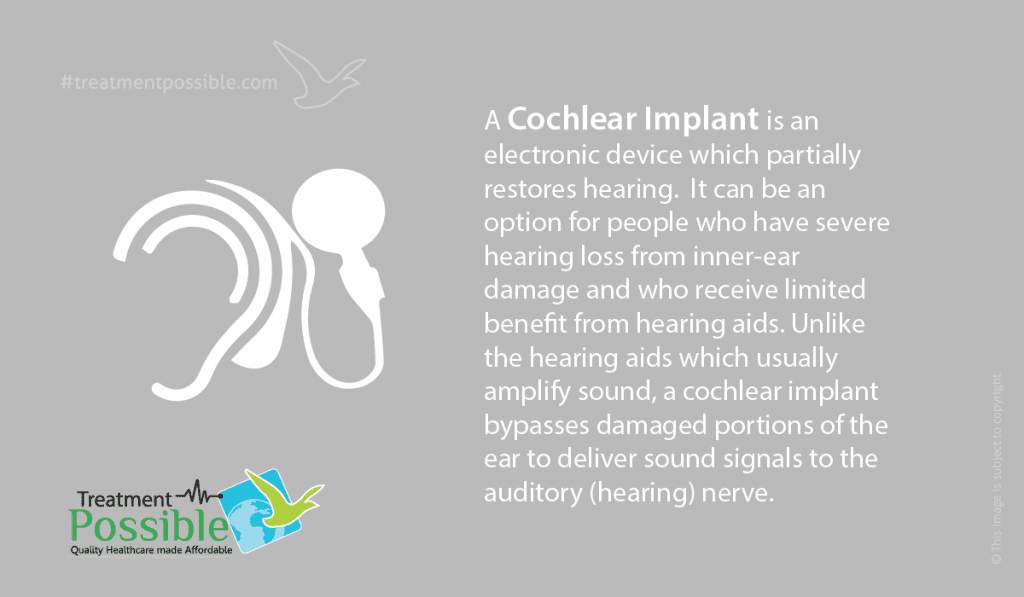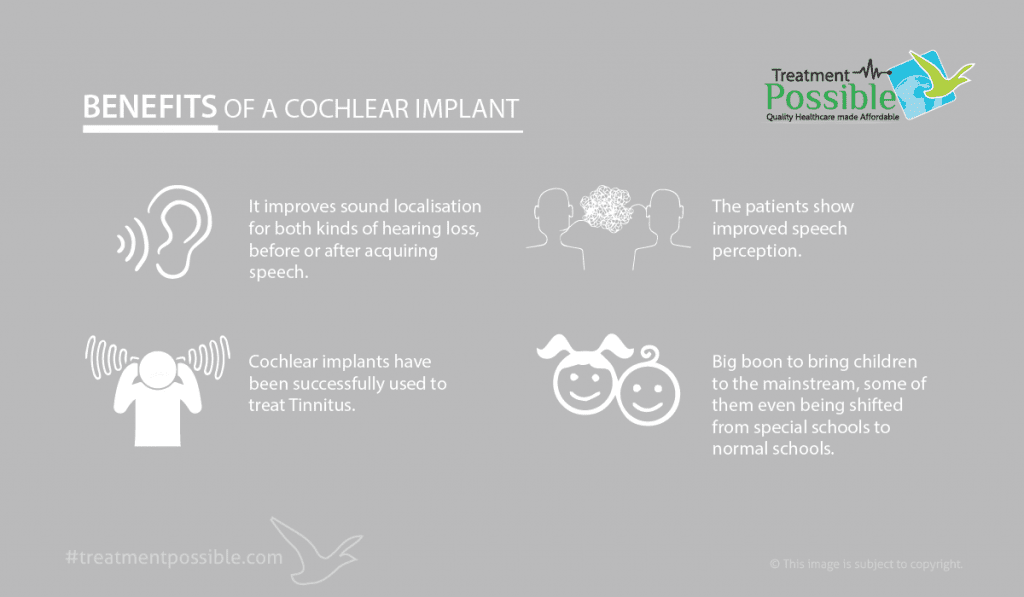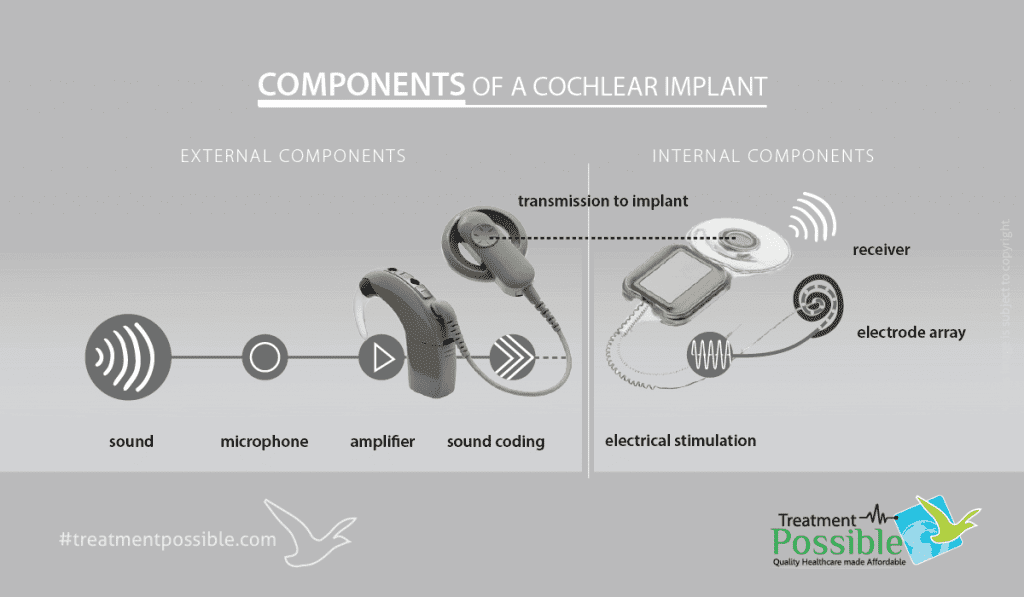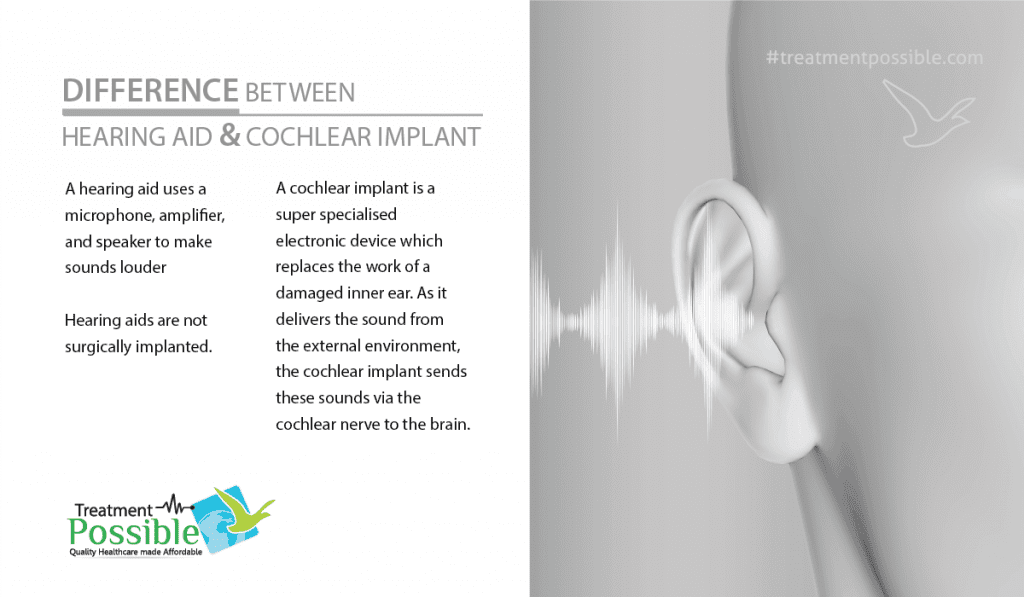What is a Cochlear Implant?
A cochlear implant is an electronic device which partially restores hearing. It can be an option for people who have severe hearing loss from inner-ear damage and who receive limited benefits from hearing aids. Unlike hearing aids which usually amplify sound, a cochlear implant bypasses damaged portions of the ear to deliver sound signals to the auditory (hearing) nerve.
It is used to help hearing loss in adults, children, and babies. The cochlear implant does not restore normal hearing.
There is a difference between a cochlear implant and a hearing aid. A hearing aid uses a microphone, amplifier, and speaker to make sounds louder and hearing aids are not surgically implanted. They’re worn inside or behind the ear. Certain hearing aids may help severe hearing loss, but they will not benefit speech understanding. In such a case, a cochlear implant might be a better choice. Because the cochlear implant bypasses the damaged part of the ear the hair cells inside the cochlea and sends the sound sensations directly to the hearing nerve in the brain.
Request a Free Estimate

- Travel to India for Affordable and Advanced Healthcare
What does a Cochlear Implant do?
A cochlear implant is a hearing device wherein the stimulator is placed directly on the hearing nerve by surgery. The processor captures sounds with a microphone and then transmits them to the internal part of the implant. It takes time and training to learn to interpret the signals received from a cochlear implant. Within a year of use, most people with cochlear implants make considerable gains in understanding speech.
The cochlear implant is a super specialised electronic device which replaces the work of a damaged inner ear. As it delivers the sound from the external environment, the cochlear implant sends these sounds via the cochlear nerve to the brain.

What are the Benefits of a Cochlear Implant?
Studies have shown many positive results after a cochlear implant like it improves sound localisation for both kinds of hearing loss, before or after acquiring speech. Besides, patients show improved speech perception. Cochlear implants have been successfully used to treat tinnitus.
When used for children with profound or severe hearing loss by birth, cochlear implants can prove to be a big boon to bringing these children into the mainstream, some of them even being shifted from special schools to normal schools. It has been suggested that the implant procedure done at an earlier age stands the highest chance of improvements in hearing as the brain is still in the learning stage.

What are the Risks of Cochlear Implant Surgery?
Cochlear implantation surgery is generally safe. The risks include:
- Implantation of the device may damage any remaining ability to hear in that ear.
- Inflammation of the membranes surrounding the brain and spinal cord (meningitis) following cochlear-implant surgery in children. Vaccinations to prevent meningitis are generally given before implantation.
- Occasionally, surgery to repair or replace a faulty device.
Rarely, the risks can include:
- Facial paralysis
- Infection at the surgery site
- Balance problems
What are the Components of a Cochlear Implant?
The cochlear implant has external and internal parts. The external parts consist of the following:
- Microphone (one or more) – the main function of the microphone is to pick up sounds from the outside world. It is thus suitably placed somewhere behind the patient’s ear generally.
- Speech processor – To filter out unnecessary noise, this processor is specially made to filter sounds important for audible speech.
- Transmitter – its main function is to send signals and power to the receiver sitting inside and it achieves this job by the process of electromagnetic induction.
The internal implant parts consist of the following:
- Receiver – This inevitable part works to receive signals and then processes the sounds into electric impulses.
- Electrode array – Placed deep within the cochlea, this is the most important part of the cochlear implant as it completes the function by stimulating the cochlear nerve and thus sends signals to the brain.

Who is Eligible for a Cochlear Implant?
A cochlear implant is not suitable for everyone. Therefore, the specialist will require your child’s audiological reports and CT Scan and MRI of the Temporal bone to decide for the same. However, babies, children, and adults can be a candidate for a cochlear implant in the following condition:
- severe hearing loss in both ears
- Have not found benefits from hearing aids
- If hearing aids aren’t able to improve your hearing or speech.
Nowadays, children who are born with a profound hearing loss in both ears can even receive two cochlear implants, one for each ear which can be implanted at the same time.
What Should you know about Cochlear Implant Procedure?
Step 1 – Implantation: Surgery is done under general anaesthesia and it usually takes between two and four hours in the hospital. Although the internal components have been placed, your child will not be able to hear yet. Then the time is given for the surgical site to be healed before the external device is placed. The cochlear implants will not be activated until two to six weeks after surgery. This is to give the surgery time to heal.
Step 2 – Mapping & Switch On: After the incision is healed, the programming of the speech processor will be carried out and the tuning and adjustments to the cochlear implant would be done as your child begins his or her new hearing journey.
Step 3 – Auditory-Verbal Therapy: Several follow-up visits are required over a few months to adjust the sound signals. Your child should also undergo extensive rehabilitation to improve their speech, language and hearing skills.

How is a Cochlear Implant Surgery Performed?
Step 1 – your child is given general anaesthesia and once your child is asleep, the surgeon will shave a little bit of hair around the ear where the implant will be placed. A small incision (cut) will be made in the skin behind the ear, and a small “seat” will be created in the bone behind the ear to hold and protect the implant.
Step 2 – The surgeon then makes a tiny hole in the cochlea and they insert the electrodes through the hole. The implant will be secured in place behind the ear, and the skin will be closed with several stitches. These stitches will dissolve on its own and it does not need to be removed.
Step 3 – Once the surgery is complete, your child will be moved to the recovery unit, and you will be called so that you can be with your child as he or she wakes up. Your child will be closely monitored to make sure you don’t have any side effects from the surgery. Your child will be discharged a few hours after the surgery or the next day.
Want more clarification about medical expense & treatment plan?
Plan Your Cochlear Implantation In India
Get a Free Doctor's OpinionWhatapp UsActivation of Cochlear Implant after Surgery:
The cochlear implants will not be activated until two to six weeks after surgery. During the time between surgery and implant activation, the child will not be able to wear a hearing aid in the implanted ear so your child will not be able to hear in that ear. If a hearing aid is worn in the non-implanted ear, the child should continue wearing this aid during the time between surgery and activation. To activate the cochlear implant, an audiologist will:
- Adjust the sound processor to fit the patient.
- Check the components of the cochlear implant to make sure they work.
- Determine what sounds the patient hears.
- The information would be given on the proper care and usage of the device.
Rehabilitation after Cochlear Implant Surgery:
Your child will also need a therapy called audiologic rehabilitation. This will help your child to improve hearing and speech skills. Your child will need to practice listening and speaking as much as possible. Please keep in mind that progress may take some time, but persistence and consistency can help.
Rehabilitation involves training the brain to understand sounds that are heard through the cochlear implant. The brain needs time to recognize what these sounds mean. This process is on-going and is best achieved by wearing the speech processor continuously as long as your child is awake.
What happens after the Cochlear Implant?
After the cochlear implant surgery, your child may experience discomfort over the implanted device or might feel dizziness. Your child may have mild to moderate pain and the doctor may recommend pain medicines accordingly. Your child’s surgeon will tell you when your child may return to normal activities, such as school, play, gym and sports.
Your child will need your dedicated support to learn how to use the new “sound” that he or she will receive through the cochlear implant. Your child will need frequent programming sessions with the audiologist, as well as hearing therapy with the speech/language pathologist. Your child also will need intensive hearing and speech therapy through early intervention or school-age services, with professionals who are trained in the development of hearing skills with a cochlear implant. The follow up will be an important part of your child’s success with his or her cochlear implant.
What are some Facts about the Cochlear Implant?
- Cochlear implants do not restore a person’s hearing to normal and for some, it may not help with hearing at all.
- Your child may lose the rest of your natural hearing in the ear after the implant.
- Your child may need to use new or recharged batteries every day.
- Your child should remove the external part of the implant when bathing or swimming
- Static electricity may harm a cochlear implant. Your child will need to take care around computer and TV screens etc.
- The implant can set off security systems, such as metal detectors.
- The Implants may be affected by cell phones and radio transmitters.
- While travelling by flight, it must be turned off during the take-off and landing.
- Up to 20 return visits may be needed within the first year for fine-tuning of the speech processor and auditory training or aural habilitation.
- Follow-up audiology and speech-language services maximize a child’s potential for the development of auditory and spoken language skills.
- Your child may not be able to have certain medical tests. These include magnetic resonance imaging (MRI), electroconvulsive therapy (ECT), and ionic radiation therapy.
- A cochlear implant may be recommended if your child is 12 months or older; has severe to profound hearing loss in both ears, and his or her ability to hear and recognize speech did not improve through the use of traditional hearing aids.
- The cochlear implant surgery is only the first step in helping a child with hearing loss—it will take months of listening before your child will be able to use the sound provided by the cochlear implant. Your child will need to make many visits to the audiologist and receive educational support to make full use of the cochlear implant.
Treatment Possible makes Cochlear Implant for Children Easier and Affordable:
With a high credibility and reputation report, treatment possible works out the best possible ways to arrange for cochlear implant surgery for hearing loss. Consultation with the most experienced specialists in this field is arranged. Most of the doctors are trained abroad and all of them are updated about the latest medical advances in innovative interventional techniques using only the best available technology in this field.
Ethical practice is strictly followed and thus informed consent to treatment is our base of work. To make the best quality care available to the patients, treatment possible works round the clock to provide a sincere and efficient medical and support staff team who arranges every tiny detail like travel, stay and treatment procedures. Cutting down on unnecessary expenses and concentrating on choosing the right doctor and hospital is our mainstay and that is why we manage to offer highly cost-effective treatment packages. Treatment Possible ensures high-quality cochlear implant surgery is provided while we guarantee the lowest cost. Our understanding of the Indian Healthcare market and our valued relationship with surgeons enable us to provide costs that are reasonable, affordable and transparent.
You can also send your medical reports for treatment with the best hospital in India to care@treatmentpossible.com for free opinions and suggestions from the Top Cochlear Implant surgeons with the hassle-free setup of post-operative recovery care, medical travel & stay during the Medical treatment. No matter what the health condition, you always get good healthcare options and cost advantage from Treatment Possible.
Our Services
From Treatment To Recovery, We Are Always There With You!

Medical Visa Letter
We provide a Medical visa letter for which we require the scanned passport copies of the patient and attendant.

Arrange An Appointment With A Surgeon
We arrange for the appointment with the surgeon, confirm for the hospital room and operation theatre (if required)

Post Surgery Follow Up
We help you to fix your telephonic appointment for future follow-ups

Complimentary Pickup
We arrange for complimentary pickup and drop services from the airport.

All The Necessary Arrangements
We arrange for hospital admission, forex exchange, sim card and local assistance

No Need To Worry About Essential Expenses!
We help in sorting out the hospital bill, return ticket, medicines and other essential purchases.
Frequently Asked Questions:
What is the approximate cost of cochlear implant surgery?
The approximate cost of cochlear implant surgery in India is about USD 15,200 to 24,200.
How long is recovery from a cochlear implant?
The doctor will not turn on, or activate, the implant until the incision has healed. This is in about 3 to 6 weeks. Most people can return to work 1 to 2 weeks after surgery. After the surgery, the patient requires about 6 months of speech therapy.
How long does a cochlear implant battery last?
Depending on the audio processor and battery pack you use, a set of zinc-air batteries will last for 60—90 hours approximately. Silver-oxide and alkaline batteries will also work with cochlear implants.
What about the maintenance and control after the cochlear implant?
Your child will require intensive training after surgery and constant supervision and rehabilitation. Cochlear Implants may require calibration in the form mapping, time to time.
